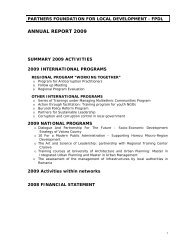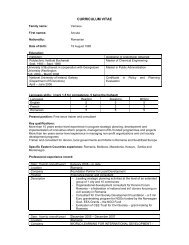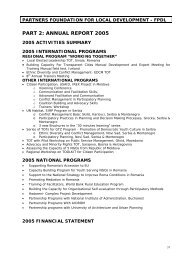Organizational Development: A Manual for Managers and ... - FPDL
Organizational Development: A Manual for Managers and ... - FPDL
Organizational Development: A Manual for Managers and ... - FPDL
You also want an ePaper? Increase the reach of your titles
YUMPU automatically turns print PDFs into web optimized ePapers that Google loves.
well is a kind of mental disease. The problem of ‘motivating’ healthy people is an artificial one. If<br />
they were not de-motivated by something – they would tend to work well. Most real problems are<br />
related to de-motivation that comes from a hopeless arrangement of the work, wrong assignments,<br />
bad technologies or organization, poor job content, irrelevant feedback or stupid leadership – all of<br />
which are in the h<strong>and</strong>s of the manager. No one can be more harmful to an organization than its<br />
boss.<br />
Management <strong>and</strong> leadership<br />
A manager has a lot to do in an organization. He is designer <strong>and</strong> constructor, supervisor <strong>and</strong><br />
supplier, politician <strong>and</strong> finance analyst, physician <strong>and</strong> trainer, father <strong>and</strong> mother, <strong>and</strong> so on. One of<br />
his common functions is to be a leader. The terms ‘management’ <strong>and</strong> ‘leadership’ are not<br />
synonyms. A manager is not necessary a good leader. He or she may very successfully lead an<br />
organization to disaster.<br />
As Encyclopaedia Britannica explains: "’Leadership’ can come from an individual, a collective<br />
group of leaders, or even from the disincarnate - if not mystical – characteristics of a celebrity<br />
figure head (compare hero). Yet other usages have a ‘leadership’ which does little active leading,<br />
but to which followers show great (often traditional) respect (compare the courtesy title reverend).<br />
Followers often endow the leader with status or prestige. … Note that the ability to influence others<br />
does <strong>for</strong>m an integral part of the ‘leadership’ of some but not all front-runners. A front-runner in a<br />
sprint may ‘lead’ the race, but does not have a position of ‘leadership’ if he does not have the<br />
potential to influence others in some way. Thus one can make an important distinction between<br />
‘being in the lead’ <strong>and</strong> the process of leadership. Leadership implies a relationship of power - the<br />
power to guide others.”<br />
Thus, being ‘leader’ may mean being in a position to lead – due to <strong>for</strong>mal power or because of<br />
special psychological features, prestige, a nice face, or whatever else. It may also mean doing the<br />
job of leading. Guiding others is not only issuing orders or directives (<strong>for</strong> which holding a <strong>for</strong>mal<br />
position would be enough), but is assuring that others are willing to follow (where <strong>for</strong>mal power<br />
may not help). To do this job of leading well, a manager needs the special qualifications <strong>and</strong> skills<br />
of leadership - which is a common agenda <strong>for</strong> many books <strong>and</strong> training courses. But our manual is<br />
about developing organizations, so we will focus on this specific aspect of a manager’s job.<br />
Changing role of manager<br />
Neil Glass made a good observation about the principal changes in the whole approach to<br />
management <strong>and</strong> control – the evolution from traditional to more contemporary models of<br />
113
















